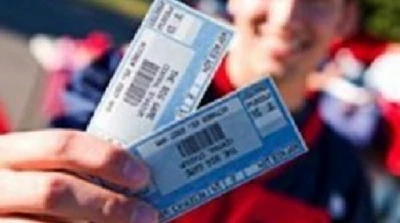Miscellaneous
-
February 2015
published: 12 /
4 /
2015

In 'Condemned to Rock 'n' Roll' Ben Howarth reflects on recent UK government legislation towards the growing problem of ticket touts
Article
A few years ago, I was at a gig with a spare ticket, and heard a group of teenagers asking if anyone had tickets going. I did, and it was theirs at face value.
“Face value?” they laughed incredulously. The most they would pay was half what I'd paid. The touts would drop their prices eventually, they said, so why should they pay more?
I decided I'd rather nobody had my ticket than these grasping little swindlers, though I'm sure some mug eventually gave in and let them have an unearned bargain. These urchins weren't touts, but they may as well have been.
Culture Secretary Sajid Javid thinks that ticket touts are “classic entrepreneurs”.They have spotted a way to make some money and they are taking it. According to the man appointed to champion and protect the arts in Britain, anyone who thinks that tickets should be sold at face value are “chattering middle classes and champagne socialists, who have no interest in helping the common working man earn a decent living by acting as a middleman in the sale of a proper service.”
In January, he refused to support the latest in a long line of attempts to do something to protect music and sports fans from the menace of touting. The amendment the Government defeated wouldn't even stop touting – it would merely force the touts to be honest about what they are selling. Apparently, it would be too “burdensome” for people trying to sell tickets to go to the lengths of giving the person buying them the booking number and an accurate idea of where they will be sitting.
Many sporting and cultural institutions have led the campaign for reforms to what the Government and their co-conspirators in the touting industry like to call the 'secondary market'. This may seem like a bet against their better interests – after all, the main effect of touting is inflated prices, as venues realise that what people are prepared to pay on the black market they will also happily pay to the original seller too. But organisations like the Rugby Football Union have realised that what may be in their short term interests will damage the long term integrity of their product.
Sitting back and waiting for the worst government Britain has had since World War Two to act is not enough. Ticket sellers (and that includes bands and promoters) shouldn't just be lobbying for a law change – it should be pro-actively offering alternatives. It isn't as if the answers aren't obvious – a desk outside a music venue on the night of the gig could charge a small commission for offering fans with extra tickets a chance to find buyers. No need for Sajid Javid's middleman – and an easy way to check that the tickets being sold will actually gain legitimate entry to the show.
Reading the text of January’s Commons debate, the blithering idiocy of the MPs who argued against what was being confused is simply astonishing. However, the most idiotic of all – right wing maniac Philip Davies MP – who believes to his quivering core that touting is the market at its purest and must go ahead unchecked, astonishingly made one sensible point about the state of the music industry.
He pointed out that, “There is no doubt that the people buying up the tickets to sell on are helping (promoters) to get all the money in on day one and therefore helping their cash flow..They are creating the problem they are complaining about and I am afraid I have absolutely no sympathy with them. If they are serious about tackling this problem, the solutions are in their own hands: they should sell tickets in dribs and drabs so that people can go on the day and buy a ticket at face value. That would, at a stroke, make a massive difference to the secondary market.”
And yet, despite this reasonable acknowledgement that those putting on event could do more, Davies so spectacularly misses the point on everything else. The amendment was not proposing a ban on ticket touting. It merely requires to be honest about who they are and what they are selling. Even the lunatics on the right-wing fringe of the Conservative Party should have no real objection to that.
So what on earth is the Government playing at? They argue that, if promoters knew who had placed a ticket up for resale, they would then be able to cancel that ticket and sell it again. Quite why it wouldn't be possible to just outlaw that clearly unwelcome development was never adequately explained.
Astonishingly, the Minister responsible (Jo Swinson – if you are unlucky enough to live in her Scottish constituency, remember who not to vote for) then tried to claim that the requirement for the seller to provide a name would put teenagers at risk online. Again, she could not explain why this true for ticket sellers, but not for those selling on the similar Amazon or ebay online marketplaces.
At the end of the debate, 289 MPs voted with the Government to defeat a simple requirement that sellers of tickets be honest about who they are and what they are selling. All 289 of them should hang their heads in shame – and gig goers should make a point of not voting for any of them in the next election.